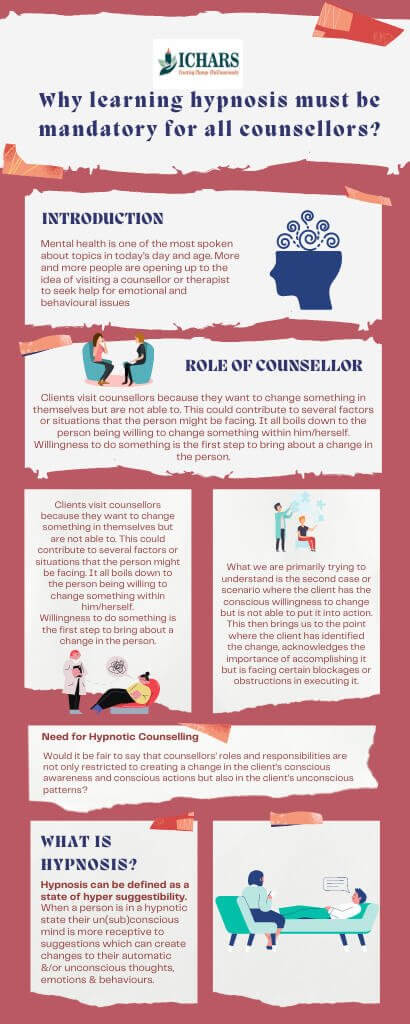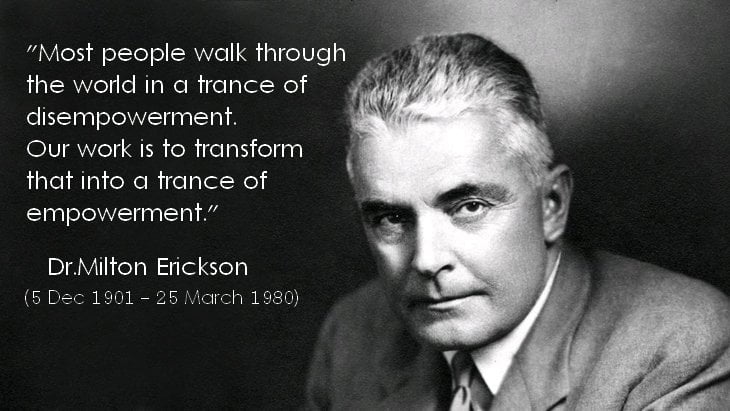In this post we will focus on understanding what is the role of a counsellor and how hypnotic counselling can help the counsellor fulfil that role effectively.
Introduction
Mental health is one of the most spoken about topics in today’s day and age. More and more people are opening up to the idea of visiting a counsellor or therapist to seek help for emotional and behavioural issues.
While this is a good transition, it is also true that in today’s fast paced world people expect quick and sustainable results. They don’t have the time to visit a counsellor every alternate day for a year. As a result there is a lot more focus on techniques and approaches that are solution focused and brief.
Counsellors are also looking for ways to achieve more sustainable results with clients in a shorter duration of time. And that is why hypnotic counselling is becoming more and more important.
Before we dive into the main topic of hypno-counselling, let’s first understand the prime reason why people choose to visit counsellors.
Role of Counsellor
 Clients visit counsellors because they want to change something in themselves but are not able to. This could contribute to several factors or situations that the person might be facing. It all boils down to the person being willing to change something within him/herself.
Clients visit counsellors because they want to change something in themselves but are not able to. This could contribute to several factors or situations that the person might be facing. It all boils down to the person being willing to change something within him/herself.
Willingness to do something is the first step to bring about a change in the person.
So, what happens if there is no conscious willingness within the client (to change something)?
In a case like this, the counsellor will first work towards helping the client understand why change is necessary. Once the client understands the change, the client will be able to execute or develop a plan of action to accomplish that change. Now if the client feels he/she can execute the plan by themselves, the process of counselling comes.
What we are primarily trying to understand is the second case or scenario where the client has the conscious willingness to change but is not able to put it into action. This then brings us to the point where the client has identified the change, acknowledges the importance of accomplishing it but is facing certain blockages or obstructions in executing it.
In order to simplify this, let’s take an example of Amit who wants to bring a conscious change in his habit which revolves around nail-biting.
 To begin with, Amit was not even aware of this habit. Until one day, his colleagues brought this to his awareness because they felt it could tarnish his reputation especially when in a formal setup (meeting with his seniors/bosses). Amit finally decided that it is time to get help and visits a counsellor for the same.
To begin with, Amit was not even aware of this habit. Until one day, his colleagues brought this to his awareness because they felt it could tarnish his reputation especially when in a formal setup (meeting with his seniors/bosses). Amit finally decided that it is time to get help and visits a counsellor for the same.
During his conversations with the counsellor, he realises that his nail biting generally happens at the time of anxiety and stress. The counsellor tries to amend this behaviour by making Amit take corrective measures. Amit is asked to become more aware of when the nail biting happens and what triggers the same. The idea is that if he is aware, he would probably stop himself from doing it.
He is also asked to identify the thoughts he has at the time of the trigger. He is also taught to restructure his thoughts is asked to restructure them in the presence of the trigger.
He returns back to the counsellor after sometime stating that he tried restructuring the thoughts but by the time he became aware, he was already biting his nails.
He also tells the counsellor that he has consciously tried to make his hand stop from reaching his mouth, but it is like a constant struggle. It is almost like he is fighting with himself and that it is becoming too much of a work for him.
This further stresses him out which eventually results in his hand ending up reaching his face and the nails are bitten.
Although the counsellor’s effort to break this pattern is worth appreciating. The basic idea is that if Amit becomes more aware of when he is about to bite his nails, he would stop himself from biting them. And if doesn’t bite his nails for long enough, his existing behavioural pattern of biting nails will be broken.
Sadly some patterns which are automatic or unconscious cannot be changed just by making the client aware of them. Since a habit once formed generally gets initiated automatically / unconsciously, the counsellor needs to learn to work with it.
Need for Hypnotic Counselling
 Would it be fair to say that counsellors’ roles and responsibilities are not only restricted to creating a change in the client’s conscious awareness and conscious actions but also in the client’s unconscious patterns?
Would it be fair to say that counsellors’ roles and responsibilities are not only restricted to creating a change in the client’s conscious awareness and conscious actions but also in the client’s unconscious patterns?
And this is exactly where hypnosis comes into play, as it can help clients connect with their unconscious, help them understand the unconscious patterns and create a change in these patterns at the level of unconscious.
What is hypnosis?
Hypnosis can be defined as a state of hyper suggestibility. When a person is in a hypnotic state their un(sub)conscious mind is more receptive to suggestions which can create changes to their automatic &/or unconscious thoughts, emotions & behaviours. This enables him/her to create possibilities and create changes as desired by him/her more easily.
We already know that for a change to be sustainable, it needs to take place not just in conscious awareness but also in unconscious/automatic responses.
Any process that works with the unconscious, irrespective of what name it is called, is just an application of hypnosis.
Why counsellors must learn Hypnosis?
 So the truth is, a counsellor (in sessions where he/she has been successful) uses hypnosis knowingly or unknowingly. Since that is the case, it is better for the counsellor to learn hypnosis and use it consciously, instead of letting chance determine whether or not the client gets into that state.
So the truth is, a counsellor (in sessions where he/she has been successful) uses hypnosis knowingly or unknowingly. Since that is the case, it is better for the counsellor to learn hypnosis and use it consciously, instead of letting chance determine whether or not the client gets into that state.
Therefore, it’s of utmost importance for counsellors to learn and understand the process of Hypnosis. Hypnosis in modern-day is not just the most powerful, but the only tool, to create a change at both conscious and unconscious levels..
The benefit hypnotic counselling gives to clients has been observed by multiple mental health practitioners. This has brought it into the limelight, thereby a lot of practitioners moving towards Hypnosis rather than sticking to the classical approaches in Psychology.
If you are a counsellor, who is interested in learning more about application of hypnosis, you can start by going through our blogs or you can just enrol for our unique program that integrates different approaches to psychotherapy (cognitive, behavioural, psycho-dynamics and humanistic) with powerful techniques from Hypnosis, NLP, Metaphors and Mindfulness.

